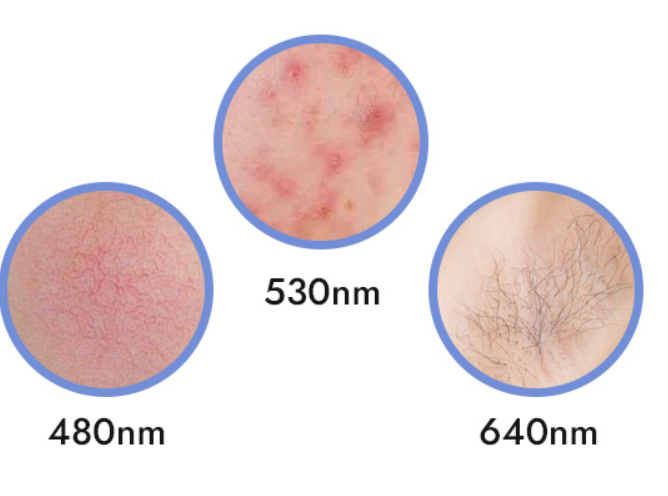The effectiveness of laser hair removal machines can vary depending on several factors, including the individual’s skin and hair type, the area being treated, the skill and experience of the practitioner performing the treatment, and the specific laser technology being used.
In general, laser hair removal can provide long-term hair reduction, but it may not be permanent. Multiple treatments are typically required to achieve the desired results, and maintenance treatments may be needed to maintain the effect.
The success of laser hair removal also depends on the color of the hair and skin. Laser hair removal works best on people with light skin and dark hair, as the laser energy is absorbed by the melanin pigment in the hair follicle. Laser hair removal is less effective on people with lighter hair colors, such as blonde, gray, or red hair, as the hair follicle contains less melanin.
The effectiveness of laser hair removal can also vary depending on the type of laser technology being used. Different types of lasers may be more effective for certain skin and hair types, and some may be more comfortable and have fewer side effects than others.
To ensure the best possible results, it’s important to choose a qualified and experienced practitioner and follow their recommended treatment plan. They can assess your skin and hair type and recommend the best laser technology for your specific needs.

How Long Can Laser Hair Removal Last?
After undergoing laser hair removal treatment, it is normal for hair to continue to grow in the treated area for a short period of time before falling out. This process typically takes about 1 to 3 weeks, depending on the individual and the area being treated.
After the initial shedding, it may take several weeks or even months before any regrowth is visible. The length of time before hair begins to grow back can vary depending on the individual and the area being treated. In general, hair regrowth is slower and less noticeable after laser hair removal compared to other hair removal methods, and the hair that does grow back is usually lighter and finer.
It’s important to note that laser hair removal typically requires multiple treatment sessions to achieve the desired results, and maintenance treatments may be needed to maintain the effect. The timing and frequency of these treatments may vary depending on the individual and the area being treated, and should be discussed with a qualified and experienced practitioner.
The rate of hair growth can vary depending on the individual, but in general, hair growth tends to be faster in certain areas of the body than others. For example, hair on the face and underarms tends to grow faster than hair on the legs and arms.
Additionally, the rate of hair growth can be influenced by factors such as age, genetics, hormones, and medication use. For example, hormonal changes during pregnancy or menopause can affect the rate of hair growth, and certain medications such as chemotherapy drugs can cause temporary or permanent hair loss.
It’s important to note that laser hair removal may be more effective in certain areas of the body than others, depending on the rate of hair growth and the thickness and color of the hair. A qualified and experienced practitioner can assess your individual needs and recommend the best laser technology and treatment plan for your specific situation.
Hair and skin color can make a difference in the effectiveness and safety of laser hair removal. Laser hair removal works by targeting the pigment in the hair follicle, so hair that is darker in color tends to respond better to treatment than lighter hair.
Similarly, skin color can also affect the effectiveness and safety of laser hair removal. The laser energy is absorbed by the pigment in the hair follicle, so if the skin has a lot of pigment (as in people with darker skin tones), there is a greater risk of skin damage and side effects such as hyperpigmentation, blistering, or scarring.
For these reasons, laser hair removal is generally most effective and safe for people with light skin and dark hair. However, advances in laser technology have made it possible for laser hair removal to be performed safely and effectively on people with darker skin tones as well, using specific types of lasers and carefully calibrated settings.
If you’re considering laser hair removal, it’s important to choose a qualified and experienced practitioner who can assess your skin and hair type and recommend the best laser technology and treatment plan for your individual needs.


To-do-list to prevent hair from growing back
There are several hair removal methods that can provide long-lasting or even permanent results, although no method can guarantee that hair will never grow back. Here are some options:
Electrolysis: This method involves using a tiny needle that delivers an electrical current to each hair follicle, destroying the hair root and preventing future growth. Electrolysis can be time-consuming and can require multiple treatments to achieve the desired results, but it is considered a permanent hair removal method.
Laser hair removal: As we discussed earlier, laser hair removal targets the hair follicle with laser energy, damaging the follicle and inhibiting future hair growth. While laser hair removal is not considered a permanent hair removal method, it can provide long-lasting results and reduce the amount of hair that grows back.
Prescription medications: Certain medications can be used to slow down or reduce hair growth, particularly in women with excessive hair growth due to hormonal imbalances. These medications include spironolactone and finasteride, and are only available by prescription.
Hair inhibitors: There are also topical products on the market that claim to inhibit hair growth over time. These products typically contain natural ingredients such as plant extracts or enzymes that interfere with the hair growth cycle, although their effectiveness is still subject to debate.
It’s important to note that all of these methods have their own risks and benefits, and what works best for one person may not be the best choice for another. It’s important to discuss your individual needs and goals with a qualified healthcare practitioner before choosing a hair removal method.